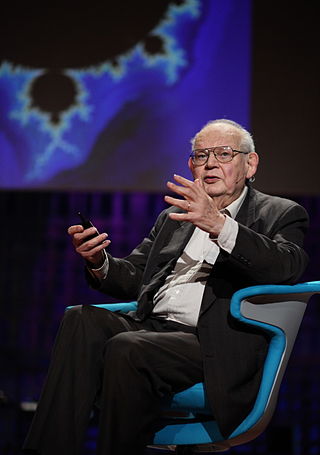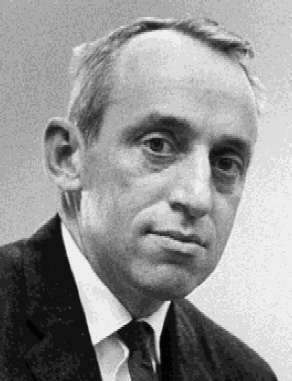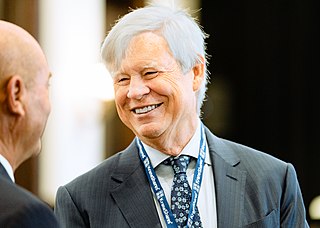
Benoit B.Mandelbrot was a Polish-born French-American mathematician and polymath with broad interests in the practical sciences, especially regarding what he labeled as "the art of roughness" of physical phenomena and "the uncontrolled element in life". He referred to himself as a "fractalist" and is recognized for his contribution to the field of fractal geometry, which included coining the word "fractal", as well as developing a theory of "roughness and self-similarity" in nature.

James Tobin was an American economist who served on the Council of Economic Advisers and consulted with the Board of Governors of the Federal Reserve System, and taught at Harvard and Yale Universities. He contributed to the development of key ideas in the Keynesian economics of his generation and advocated government intervention in particular to stabilize output and avoid recessions. His academic work included pioneering contributions to the study of investment, monetary and fiscal policy and financial markets. He also proposed an econometric model for censored dependent variables, the well-known tobit model.
An economist is a professional and practitioner in the social science discipline of economics.

Eugene Francis "Gene" Fama is an American economist, best known for his empirical work on portfolio theory, asset pricing, and the efficient-market hypothesis.

Robert Fry Engle III is an American economist and statistician. He won the 2003 Nobel Memorial Prize in Economic Sciences, sharing the award with Clive Granger, "for methods of analyzing economic time series with time-varying volatility (ARCH)".
Kenneth Jan Singleton is an American economist. He is a leading figure in empirical financial economics, and a faculty member at Stanford University. As the Adams Distinguished Professor of Management, Emeritus at Stanford Graduate School of Business, Singleton teaches a variety of degree courses in finance.

Lars Peter Hansen is an American economist. He is the David Rockefeller Distinguished Service Professor in Economics, Statistics, and the Booth School of Business, at the University of Chicago and a 2013 recipient of the Nobel Memorial Prize in Economics.
Frank J. Fabozzi is an American economist, educator, writer, and investor, currently Professor of Practice at The Johns Hopkins University Carey Business School and a Member of Edhec Risk Institute. He was previously a Professor of Finance at EDHEC Business School, Professor in the Practice of Finance and Becton Fellow in the Yale School of Management, and a visiting professor of Finance at the Sloan School of Management at the Massachusetts Institute of Technology. He has authored and edited many books, three of which were coauthored with Nobel laureates, Franco Modigliani and Harry Markowitz. He has been the editor of the Journal of Portfolio Management since 1986 and is on the board of directors of the BlackRock complex of closed-end funds.
Financial risk modeling is the use of formal mathematical and econometric techniques to measure, monitor and control the market risk, credit risk, and operational risk on a firm's balance sheet, on a bank's accounting ledger of tradeable financial assets, or of a fund manager's portfolio value; see Financial risk management. Risk modeling is one of many subtasks within the broader area of financial modeling.

William Arnold Barnett is an American economist, whose current work is in the fields of chaos, bifurcation, and nonlinear dynamics in socioeconomic contexts, econometric modeling of consumption and production, and the study of the aggregation problem and the challenges of measurement in economics.
Tim Peter Bollerslev is a Danish economist, currently the Juanita and Clifton Kreps Professor of Economics at Duke University. A fellow of the Econometric Society, Bollerslev is known for his ideas for measuring and forecasting financial market volatility and for the GARCH model.
In financial econometrics, the Markov-switching multifractal (MSM) is a model of asset returns developed by Laurent E. Calvet and Adlai J. Fisher that incorporates stochastic volatility components of heterogeneous durations. MSM captures the outliers, log-memory-like volatility persistence and power variation of financial returns. In currency and equity series, MSM compares favorably with standard volatility models such as GARCH(1,1) and FIGARCH both in- and out-of-sample. MSM is used by practitioners in the financial industry to forecast volatility, compute value-at-risk, and price derivatives.

Markus Konrad Brunnermeier is an economist, who is the Edwards S. Sanford Professor of Economics at Princeton University.
John Howland Cochrane is an American economist who has served as the Rose-Marie and Jack Anderson Senior Fellow at the Hoover Institution since 2015. A specialist in financial economics and macroeconomics, he has been a professor of finance and economics by courtesy at the Stanford Graduate School of Business since 2016. From 1994 to 2015, he served as the AQR Capital Management Distinguished Service Professor of Finance at the University of Chicago Booth School of Business.
Mathematical finance, also known as quantitative finance and financial mathematics, is a field of applied mathematics, concerned with mathematical modeling in the financial field.

Svetlozar (Zari) Todorov Rachev is a professor at Texas Tech University who works in the field of mathematical finance, probability theory, and statistics. He is known for his work in probability metrics, derivative pricing, financial risk modeling, and econometrics. In the practice of risk management, he is the originator of the methodology behind the flagship product of FinAnalytica.

Willi Semmler is a German born American economist who currently teaches at The New School in New York.
Pierre-Olivier Gourinchas is a French economist who has been the Chief Economist of the International Monetary Fund since 2022. Gourinchas is also the S.K. and Angela Chan Professor of Management at the University of California, Berkeley. At the University of California, he also directs the Clausen Center for International Business and Policy and is affiliated with the Haas School of Business. His research focuses on macroeconomics, in particular international macroeconomics and international finance. In 2008, Gourinchas received the Prize of the Best Young Economist of France.
The Department of Economics is an academic department of the University of Oxford within the Social Sciences Division. Relatively recently founded in 1999, the department is located in the Norman Foster-designed Manor Road Building.








